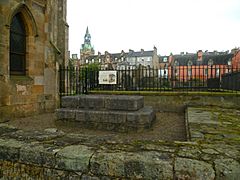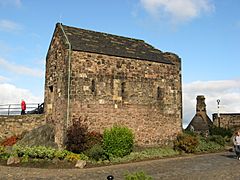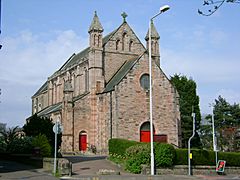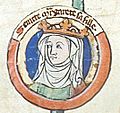Saint Margaret of Scotland facts for kids
Quick facts for kids Saint Margaret of Scotland |
|
|---|---|
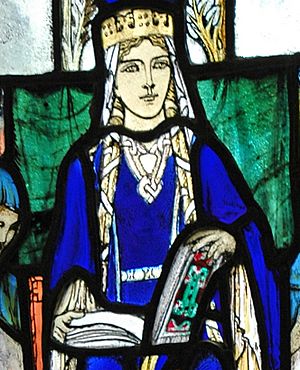
Image of Saint Margaret in a window in Edinburgh
|
|
| Queen consort of Scotland | |
| Tenure | 1070–1093 |
| Born | c. 1045 Kingdom of Hungary |
| Died | 16 November 1093 Edinburgh Castle, Edinburgh, Kingdom of Scotland |
| Burial | Dunfermline Abbey, Fife, Kingdom of Scotland |
| Spouse | Malcolm III, King of Scotland |
| Issue more... |
Edmund, Bishop of Dunkeld Ethelred Edgar, King of Scotland Alexander I, King of Scotland David I, King of Scotland Matilda, Queen of England Mary, Countess of Boulogne |
| House | Wessex |
| Father | Edward the Exile |
| Mother | Agatha |
| Religion | Catholicism |
Saint Margaret of Scotland (Scots: Saunt Magret, c. 1045 – 16 November 1093) was an English princess. She became a Scottish queen when she married King Malcolm III. People sometimes called her "The Pearl of Scotland."
Margaret was born in Hungary because her family was living in exile. She was the sister of Edgar Ætheling, who was briefly the uncrowned Anglo-Saxon King of England. Margaret and her family returned to England in 1057. However, they had to flee to Scotland after the Norman conquest of England in 1066. By the end of 1070, Margaret married King Malcolm III of Scotland, becoming the Queen of Scots.
Margaret was a very religious Roman Catholic. She did many good deeds to help others. For example, she started a ferry service across the Firth of Forth in Scotland. This ferry helped pilgrims travel to St Andrews in Fife. The towns of South Queensferry and North Queensferry are named after this ferry. Margaret was the mother of three future kings of Scotland. One of her daughters also became a queen of England. Margaret died at Edinburgh Castle in Edinburgh, Scotland in 1093. This was just a few days after she heard that her husband had died in battle.
Contents
Early Life of Margaret
Margaret was the daughter of Edward the Exile, an English prince. Her mother was named Agatha. Margaret was also the granddaughter of Edmund Ironside, who was a King of England. After King Edmund died in 1016, Edward and his brother were sent away. They ended up in Kiev and later in Hungary.
Margaret was born in Hungary around 1045. Her brother Edgar the Ætheling and sister Cristina were also born there. Margaret grew up in a very religious family and court in Hungary.
Returning to England
Margaret and her family came back to England in 1057. Her father, Edward the Exile, was called back as a possible heir to King Edward the Confessor. King Edward had no children. Sadly, Margaret's father died soon after arriving in England.
Margaret was still a child. She continued to live at the English court. Her brother, Edgar Ætheling, was also seen as a possible heir to the English throne. When King Edward the Confessor died in 1066, Harold Godwinson became king. Edgar was thought to be too young to rule. After Harold lost the Battle of Hastings later that year, Edgar was named King of England. But when the Normans attacked London, Edgar was presented to William the Conqueror. William took Edgar to Normandy. In 1068, Edgar, Margaret, Cristina, and their mother Agatha fled north to Northumbria, England.
Journey to Scotland
After the Norman conquest, Margaret's mother, Agatha, decided to leave Northumbria, England. She wanted to return to Europe with her children. However, a storm pushed their ship north to Scotland. They were shipwrecked there in 1068. King Malcolm III gave them a safe place to stay. The spot where they landed is now called St Margaret's Hope.
Some stories say that Margaret's arrival in Scotland was very romantic. One old source suggests that she and Malcolm were engaged nine years earlier. This was in 1059, when Malcolm visited Edward the Confessor's court. He wanted to arrange a marriage with Margaret. If they had an agreement, it didn't happen then. This might explain why the Scots attacked Northumbria in 1061. Another source says Margaret might not have met Malcolm III until 1070. This was after William the Conqueror's attacks in the north of England.
Malcolm III was a widower with two sons. He was likely interested in marrying Margaret. She was one of the few remaining members of the Anglo-Saxon royal family. Malcolm and Margaret married in 1070. After their marriage, Malcolm invaded Northumberland several times. He wanted to support his new brother-in-law Edgar. He also wanted to increase his own power. However, these attacks mostly just damaged the area.
Margaret's Children
Margaret and Malcolm had eight children. They had six sons and two daughters:
- Edward (born around 1071 – died 13 November 1093), killed with his father in battle.
- Edmund (born around 1071 – died after 1097).
- Ethelred, who became an abbot in Dunkeld.
- Edgar (born around 1074 – died 11 January 1107), who became King of Scotland from 1097 to 1107.
- Alexander I (born around 1078 – died 23 April 1124), who was King of Scotland from 1107 to 1124.
- Edith (born around 1080 – died 1 May 1118), who was renamed Matilda and became Queen of England.
- Mary (1082–1116), who became Countess of Boulogne.
- David I (born around 1084 – died 24 May 1153), who was King of Scotland from 1124 to 1153.
Margaret's Faith and Good Works
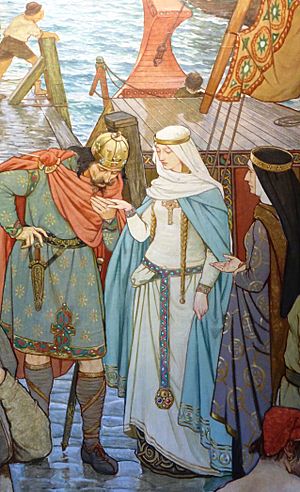
Margaret worked to improve religious practices in Scotland. She wanted the Church in Scotland to follow the ways of Rome.
She was very involved in helping others. Every day, before she ate, she served orphans and the poor. She also washed the feet of the poor, just like Jesus did. She would wake up at midnight every night to attend church services. In 1072, she successfully invited the Benedictine Order to build a monastery in Dunfermline, Fife. She also set up ferries at Queensferry and North Berwick. These ferries helped pilgrims travel from south of the Firth of Forth to St. Andrew's in Fife.
Margaret also used a cave near the Tower Burn in Dunfermline for prayer. This place, called St. Margaret's Cave, is now under a car park but is open to visitors. She also helped restore Iona Abbey in Scotland. Margaret also worked to free English exiles who had been forced into serfdom after the Norman conquest of England.
Margaret was religious in her private life too. She spent a lot of time praying and reading religious books. She also enjoyed doing church embroidery.
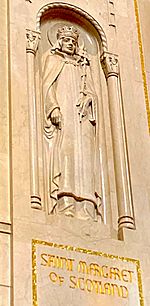
Margaret's Death
Her husband, King Malcolm III, and their oldest son, Edward, were killed. They died in the Battle of Alnwick against the English on 13 November 1093. Their son Edgar had the sad job of telling his mother the news.
Margaret was not yet 50 years old. She died on 16 November 1093, just three days after her husband and eldest son. People said she died from grief. She was buried in Dunfermline Abbey in Fife, Scotland. In 1250, the year she was made a saint, her body and her husband's were moved to a new shrine in the Abbey.
Over time, parts of her remains were moved to different places. In 1560, Mary, Queen of Scots had Margaret's head taken to Edinburgh Castle. She hoped it would help her during childbirth. Margaret's head later ended up with the Jesuits in France. But it was lost during the French Revolution. Philip II of Spain had other parts of Margaret and Malcolm III moved to a palace in Madrid, Spain. Their exact location now is unknown.
Becoming a Saint
Pope Innocent IV made St. Margaret a saint in 1250. This was because of her strong faith, her loyalty to the Roman Catholic Church, her efforts to reform the church, and her charity. On 19 June 1250, after she became a saint, her remains were moved to a special chapel in Dunfermline Abbey in Fife, Scotland.
Her feast day (a day to celebrate her) was moved by Pope Innocent XII in 1693 to 10 June. This was to honor the birthday of the son of James VII of Scotland. In 1969, the Church moved her feast day back to 16 November. This is the date she died, and it's when Scotland always celebrated her. However, some traditional Catholics still celebrate her on 10 June.
Margaret is also honored as a saint in the Anglican Communion. The Church of England and the Episcopal Church celebrate her on 16 November. She is also honored in the Antiochian Orthodox Church Western Rite.
Places Named After Saint Margaret
Many churches around the world are named after St Margaret. One of the oldest is St Margaret's Chapel in Edinburgh Castle in Edinburgh, Scotland. Her son King David I founded it. People used to think it was Margaret's own prayer room. But now it's believed to have been built in the 12th century. It is the oldest building in Edinburgh. It was fixed up in the 1800s and again in the 1990s.
-
Site of the ruined Shrine of St. Margaret at Dunfermline Abbey, Fife, Scotland
-
St Margaret's Chapel in Edinburgh Castle, Edinburgh, Scotland
-
St Margaret's Church in Dunfermline, Fife, Scotland
Images for kids
-
Margaret from a medieval family tree
See also
 In Spanish: Margarita de Escocia (santa) para niños
In Spanish: Margarita de Escocia (santa) para niños
 | Misty Copeland |
 | Raven Wilkinson |
 | Debra Austin |
 | Aesha Ash |


